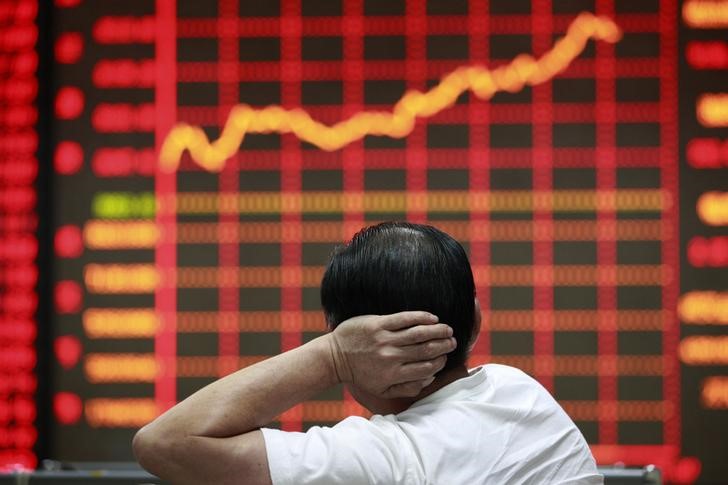Investing.com-- Asian stocks sank on Thursday, reversing some recent gains as strong U.S. retail sales data pushed up Treasury yields, while Chinese stocks fell sharply on signs of continued headwinds for the property market.
Regional markets also saw a measure of profit taking after a strong set of gains earlier this week, as markets priced in a greater chance that the Federal Reserve was done raising interest rates.
But these bets were somewhat offset by stronger-than-expected U.S. retail sales data on Wednesday, which sparked a rebound in Treasury yields and the dollar. Strength in retail spending still has the potential to push up inflation and draw a hawkish response from the Fed.
This provided a weak lead-in to regional markets, with Japan’s Nikkei 225 falling 0.8% even as data showed some improvement in exports.
South Korea’s KOSPI shed 0.2%, while Indonesian stocks led losses in Southeast Asia with a 0.4% drop.
Australia’s ASX 200 fell 0.5% as data showed a bigger-than-expected jump in employment through October. But a higher unemployment rate and weakening growth in hours worked suggested that the labor market may be cooling after a strong run over the past year.
A softer labor market gives the Reserve Bank of Australia less impetus to keep raising interest rates- a scenario that is positive for Australian markets. But a cooling labor market also points to more economic headwinds for the country.
Futures for India’s Nifty 50 index pointed to a weak open, with heavyweight technology set for some losses after a strong rise on Wednesday.
U.S. monetary policy remained squarely in focus, with a slew of Fed officials set to speak on Thursday and Friday. Most officials have maintained their stance that U.S. rates are set to remain higher for longer- which bodes poorly for Asian markets.
Chinese stocks sink on property woes, US talks in focus
China’s Shanghai Shenzhen CSI 300 and Shanghai Composite indexes fell 0.9% and 0.6%, respectively, on Thursday, while Hong Kong’s Hang Seng index lost 1.6%.
Property developers including Wharf Real Estate (HK:1997) and Longfor Properties Co Ltd (HK:0960) fell between 1% and 3%.
Sentiment towards China was dented by data showing a sustained decline in house prices through October, indicating that the country’s massive property market remained under pressure.
While other economic readings this week- particularly industrial production and retail sales- showed some resilience, a bulk of data for October pointed to sustained weakness in the Chinese economy.
Concerns over the property sector have been a major weight on Chinese markets, as several major developers struggle to restructure their debt. The sector accounts for about a quarter of China’s GDP.
A massive liquidity injection by the People’s Bank also provided only limited support to stocks.
Markets also took few cues from renewed, high-level talks between the U.S. and China after President Xi Jinping met U.S. counterpart Joe Biden in San Francisco this week. The two agreed to open a presidential hotline, and also to resume military communications, which had become severely strained over the past year.
But Biden still called Xi a "dictator" in a press conference after the summit- a comment that is expected to go poorly with Chinese authorities.
